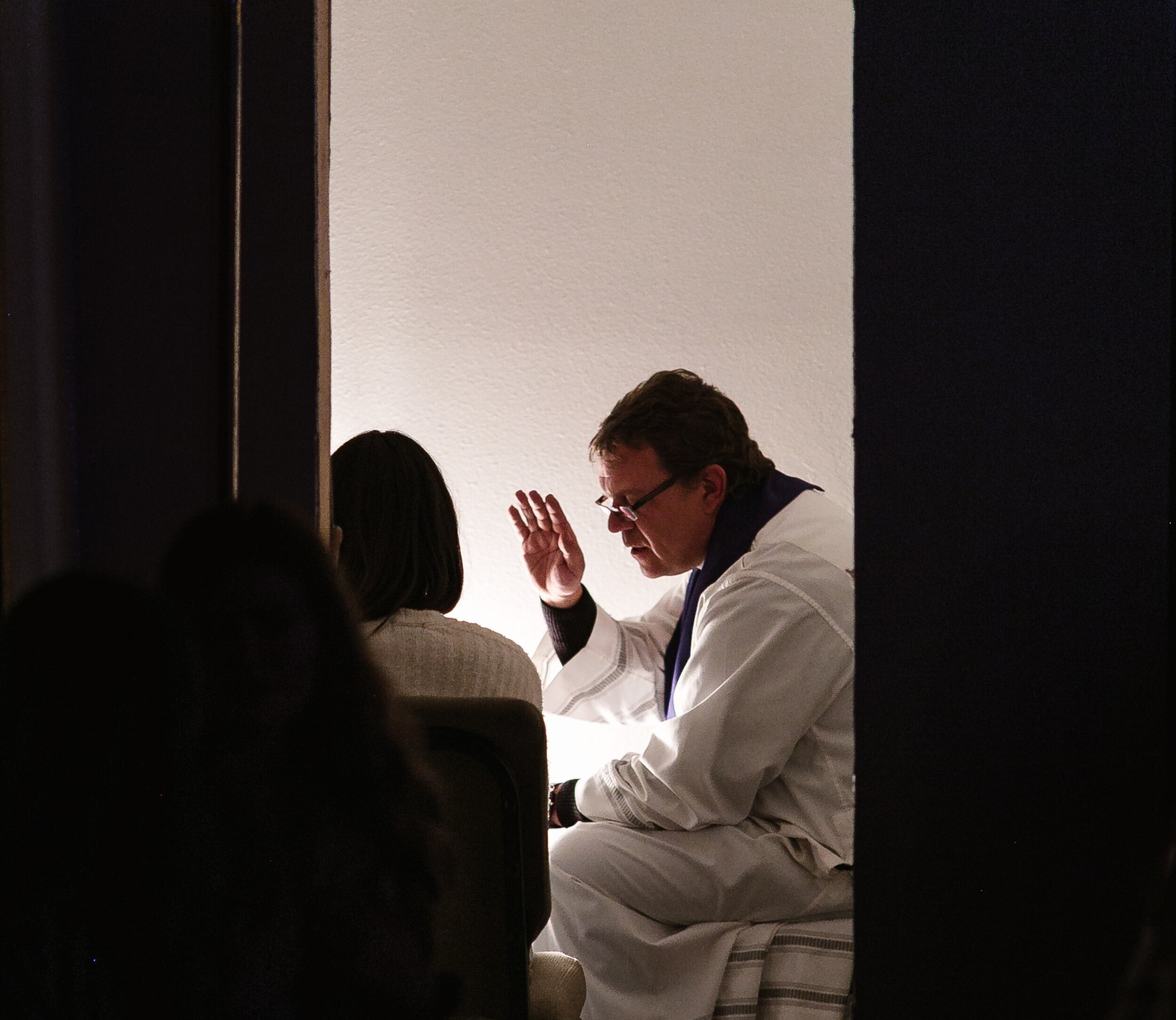
Reconciliation
“Jesus said to them again, “Peace be with you. As the Father sent me, so I send you.” Then he breathed on them and said, “Received the Holy Spirit. If you forgive people’s sins, they are forgiven; if you do not forgive them, they are not forgiven.”
John 20:21-23
“Those who approach the sacrament of Penance obtain pardon from God’s mercy for the offense committed against him, and are, at the same time, reconciled with the Church which they have wounded by their sins and which by charity, by example, and by prayer labors for their conversion.”
Catechism of the Catholic Church, 1422
The Sacrament of Reconciliation (also known as Confession) was initiated by Christ as a way to cleanse our souls of sins and to make amends with our Lord. Sin is harmful because it weakens our relationship with Jesus. He wants to be united with us. A good, honest, and reflective Examination of Conscience and Confession leads us back to a state of grace.
The love Jesus has for us is greater than any sin we have committed. We must have true sorrow in our hearts for what we have done.
If you have not been to confession in a while, we welcome you back to the Catholic Church! We understand you may feel anxious or apprehensive about confession, but there is no need to worry. Our priests are here to walk you through confession with the same love and compassion as our Lord, as when they hear our confessions, they are “In persona Christi” or “In the person of Christ.” You will be welcomed in the peace that only our Lord can bring.
If you are interested in contacting a priest for confession, please contact the Rectory at (973) 484-4600,
Confession Times
Confessions are heard in the Main Church.
Wednesdays at 6:00 PM - 7:00PM, and Saturdays from 11:30 AM - 12:30 PM.
Confessions are also available by appointment at any time.
Resources
EXAMINATION OF CONSCIENCE
Before celebrating the Sacrament of Penance, one should prepare oneself with an examination of conscience, which involves reflecting prayerfully on one's thoughts, words, and deeds in order to identify any sins.
There are various types of examinations of conscience but regardless of which one you use to prepare yourself for the Sacrament it should be rooted in Scripture; particularly, the Ten Commandments and Beatitudes. Below are a few examples of Examinations of Conscience that can help you prepare for the Sacrament.
IT HAS BEEN A WHILE SINCE I’VE BEEN TO CONFESSION.
Sometimes people are concerned because they don’t know what to say. I always tell them that the priest went to school for this… he knows how it is supposed to go if you get a little lost.
But honestly, the most important thing in going to Confession when you haven’t been for a while is: just go. I can’t tell you how many people walk in and say something like, “I haven’t been to Confession since second grade…”. So we talk and I’ll walk them through it.
It really isn’t complicated. I mean, it’s like this: when you have the inkling to get to Confession, it is usually connected to something that you know you’ve actually done. So you already know what you need to say. And God already knows what you need to say. And the priest won’t remember what it was that you needed to say after you’ve said it and he gives you absolution… so why worry?
But if you are still a little nervous, here are some steps:
Step Two: Ask the Holy Spirit to help you be honest with yourself as you read through the Examination of Conscience.
Step Three: Find out when and where the next available Confession is held.
Step Four (optional): Write down what you want to confess. It is helpful if you have figured out what the sin is “called” and include the estimated number of times you committed that particular sin.
Step Five: Show up at Confession location during Confession time.
Step Six: Walk in, let the priest know what you’re up to (You can say, “Bless me, Father. It’s been _________ long since my last Confession. Here are my sins…”. Or, if you get all deer-in-the-headlights and totally forget, just say something like, “I totally blanked. How do I start?” Or, if you have no idea what to do, just say that: “Would you be able to help me through this?” All of those are totally legit ways to do it.)
Step Seven: Listen to the priest and don’t be upset if his advice isn’t the most profound thing you’ve ever heard. (He will give you something to “do”. We call it a “penance” and it is supposed to help you take your next steps forward after the Confession is over.)
Step Eight: Leave the “Confession space” and do your penance and be joyful! After all, you’re sins are gone! How does that sound?
Does the thought of going to Confession still make you a little wary? Wonder what it’s like from the priest’s perspective to hear someone’s confession? Read this.
